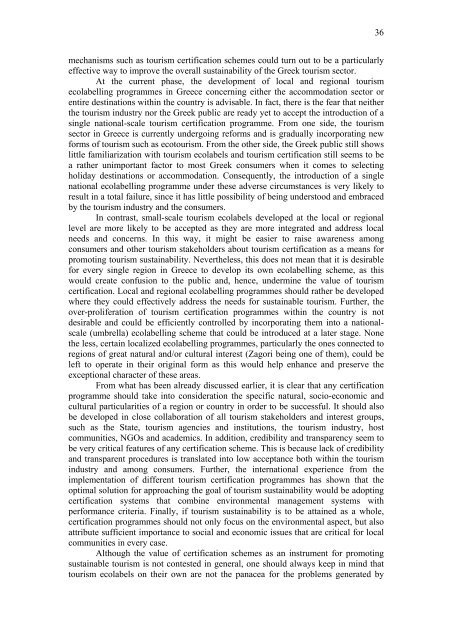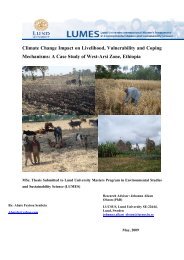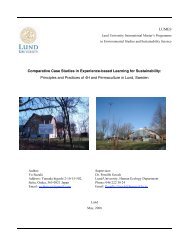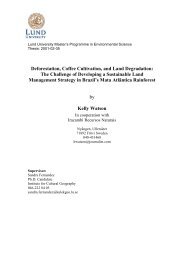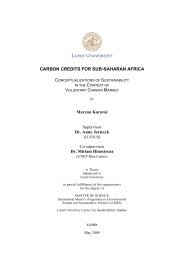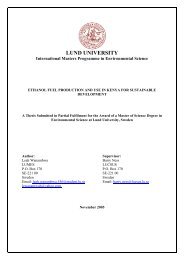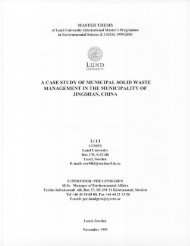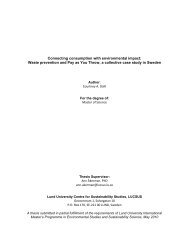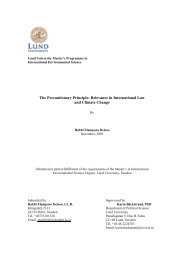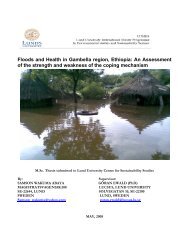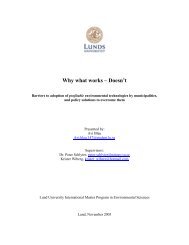Thesis title: âThe development of community-based ecotourism - lumes
Thesis title: âThe development of community-based ecotourism - lumes
Thesis title: âThe development of community-based ecotourism - lumes
You also want an ePaper? Increase the reach of your titles
YUMPU automatically turns print PDFs into web optimized ePapers that Google loves.
36mechanisms such as tourism certification schemes could turn out to be a particularlyeffective way to improve the overall sustainability <strong>of</strong> the Greek tourism sector.At the current phase, the <strong>development</strong> <strong>of</strong> local and regional tourismecolabelling programmes in Greece concerning either the accommodation sector orentire destinations within the country is advisable. In fact, there is the fear that neitherthe tourism industry nor the Greek public are ready yet to accept the introduction <strong>of</strong> asingle national-scale tourism certification programme. From one side, the tourismsector in Greece is currently undergoing reforms and is gradually incorporating newforms <strong>of</strong> tourism such as <strong>ecotourism</strong>. From the other side, the Greek public still showslittle familiarization with tourism ecolabels and tourism certification still seems to bea rather unimportant factor to most Greek consumers when it comes to selectingholiday destinations or accommodation. Consequently, the introduction <strong>of</strong> a singlenational ecolabelling programme under these adverse circumstances is very likely toresult in a total failure, since it has little possibility <strong>of</strong> being understood and embracedby the tourism industry and the consumers.In contrast, small-scale tourism ecolabels developed at the local or regionallevel are more likely to be accepted as they are more integrated and address localneeds and concerns. In this way, it might be easier to raise awareness amongconsumers and other tourism stakeholders about tourism certification as a means forpromoting tourism sustainability. Nevertheless, this does not mean that it is desirablefor every single region in Greece to develop its own ecolabelling scheme, as thiswould create confusion to the public and, hence, undermine the value <strong>of</strong> tourismcertification. Local and regional ecolabelling programmes should rather be developedwhere they could effectively address the needs for sustainable tourism. Further, theover-proliferation <strong>of</strong> tourism certification programmes within the country is notdesirable and could be efficiently controlled by incorporating them into a nationalscale(umbrella) ecolabelling scheme that could be introduced at a later stage. Nonethe less, certain localized ecolabelling programmes, particularly the ones connected toregions <strong>of</strong> great natural and/or cultural interest (Zagori being one <strong>of</strong> them), could beleft to operate in their original form as this would help enhance and preserve theexceptional character <strong>of</strong> these areas.From what has been already discussed earlier, it is clear that any certificationprogramme should take into consideration the specific natural, socio-economic andcultural particularities <strong>of</strong> a region or country in order to be successful. It should alsobe developed in close collaboration <strong>of</strong> all tourism stakeholders and interest groups,such as the State, tourism agencies and institutions, the tourism industry, hostcommunities, NGOs and academics. In addition, credibility and transparency seem tobe very critical features <strong>of</strong> any certification scheme. This is because lack <strong>of</strong> credibilityand transparent procedures is translated into low acceptance both within the tourismindustry and among consumers. Further, the international experience from theimplementation <strong>of</strong> different tourism certification programmes has shown that theoptimal solution for approaching the goal <strong>of</strong> tourism sustainability would be adoptingcertification systems that combine environmental management systems withperformance criteria. Finally, if tourism sustainability is to be attained as a whole,certification programmes should not only focus on the environmental aspect, but alsoattribute sufficient importance to social and economic issues that are critical for localcommunities in every case.Although the value <strong>of</strong> certification schemes as an instrument for promotingsustainable tourism is not contested in general, one should always keep in mind thattourism ecolabels on their ownare not the panacea for the problems generated by


